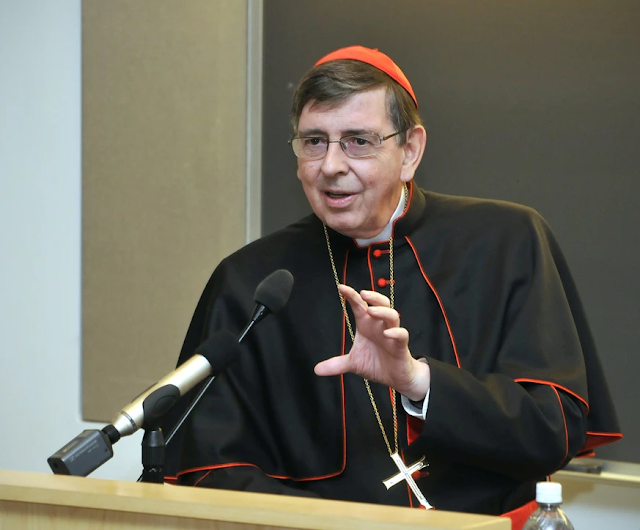Cardinal Koch on the Pope's devotion to Pentecostalism and Ecumenism
Curia Cardinal Koch: Pope relies on practical ecumenism
Head of the Vatican ecumenical dicastery sees an "open heart for ecumenical dialogue" in all popes since Vatican II, but with different accents - "great pain" over division in orthodoxy
Pope Francis is putting more emphasis on practical ecumenism in the quest for Christian unity. The Vatican Ecumenical Cardinal Kurt Koch pointed this out in a conversation with Austrian media representatives in Rome. "Walk together, pray together and work together": That is Francis' formula.
Like Francis, all popes since the time of the Vatican Council (1962-65) have had an "open heart for ecumenical dialogue". There is a "great continuity" here, said Koch, who has headed the Curial Dicastery for Promoting Christian Unity since 2010. Of course, the Pope's accents in the ecumenical area are different.
A special dimension and important element for Pope Francis is the "ecumenism of martyrs", according to the Swiss Curia cardinal. "He says the martyrs have already found unity. Because Christians are not being persecuted today because they are Orthodox, Lutherans or Catholics, but because they are Christians. And that is why the blood that Christians shed is not something that separates, but something that unites."
"If the persecutors of Christians unite us in blood, how come we Christians continue to separate in everyday life?" Pope Francis once asked this provocative question, Koch recalled. The Pope last gave an indication of the practiced ecumenism of martyrs, for example during a meeting with the Coptic Orthodox Patriarch Tawadros II in the Vatican in May. At the time, Francis announced that the 21 Coptic martyrs murdered by "Islamic State" terrorists in Libya in February 2015 would be included in the Catholic register of martyrs as a sign of the spiritual bond between the two churches.
Unity objective not abandoned
In the conversation in the Unity Dicastery, Cardinal Koch spoke to the media representatives present about the work of the Vatican Ecumenical Authority and the challenges of ecumenical activity in East and West. The past decades have shown that the dream of a very rapid unity of the church on a universal level, which existed at the beginning of the ecumenical movement, has not been achieved.
"We are 500 years apart from the Reformation Churches, and 1,500 years from the Oriental Churches - and to put things right again in such a short time was perhaps too great an illusion," said the Curia cardinal. Nevertheless, the goal of unity must not be abandoned. "Rather, we have to struggle to find a consensus on this goal and to be able to follow paths."
"Great pain" over split in Orthodoxy
Koch said it was "with great pain" to see how the war in Ukraine was splitting orthodoxy. This is also a difficulty for ecumenism. "We want to regain unity with the Orthodox Church, and she herself is in a state of great tension and division."
The Catholic Church must be very careful in this situation, according to the Vatican Ecumenical Commissioner: "We cannot interfere in this division, so we have to be neutral in some way. But neutrality does not mean indifference, but doing everything we can so that they can find their way among themselves."
Challenges for Western Ecumenism
In Western ecumenism - the area in which the Catholic Church conducts around twelve different dialogues with all churches and church communities that emerged from the Reformation - there is already consensus on many questions, but not on the actual goal of ecumenism, explained Koch. Every church has a clear idea of its nature as a church and unity in the church and strives to transfer this to the goal level. "We have as many ecumenical objectives as we have denominational ecclesiologies (doctrines about the church, ed.). That's why it seems important to me that the discussion today is focused on exchanging ideas about what the church actually is."
As the second major challenge for Western ecumenism, Koch named divisions in ethical areas as a new phenomenon. "In the ecumenical movement of the 1980s, the leitmotif was 'faith divides, action unites'. Today we have to say almost the opposite," noted the prefect of the unitary dicastery. The tensions in the area of ethics relate to the area of "marriage, family, sexuality, gender" on the one hand, as well as bioethics and questions at the beginning and end of human life. It is important to reach agreement on this, Koch stated: "Because if the Christian churches in Europe cannot credibly speak with one voice on the fundamental questions of human life and social coexistence, the Christian voice in Europe's secularized societies will weaker. And that certainly doesn't help ecumenism."
Pentecostalization of the ecumenical situation
The cardinal named the rapid growth of the evangelical, Pentecostal movement as a third challenge. One must speak of a "Pentecostalization of the ecumenical situation" or of a fourth form of church existence: Orthodox, Catholic, Protestant, Pentecostal.
"We conduct a dialogue with everyone, but of course only with those who want one," Koch said of the Pentecostals. Quite a few of these are proselytic, meaning they want to withdraw members from other churches - Catholic, but also historic Protestant ones. One advantage is that the Pope knows the Pentecostal movements very well and repeatedly invites representatives to very personal meetings away from the general public, explained the Cardinal. "That opens the gates again for further dialogue."
Cathcon: Pope's dangerous devotion to Pentecostalism opens the doors wide to any future for the Church that he wants.










.jpeg)

Comments